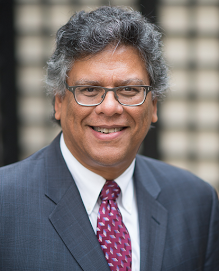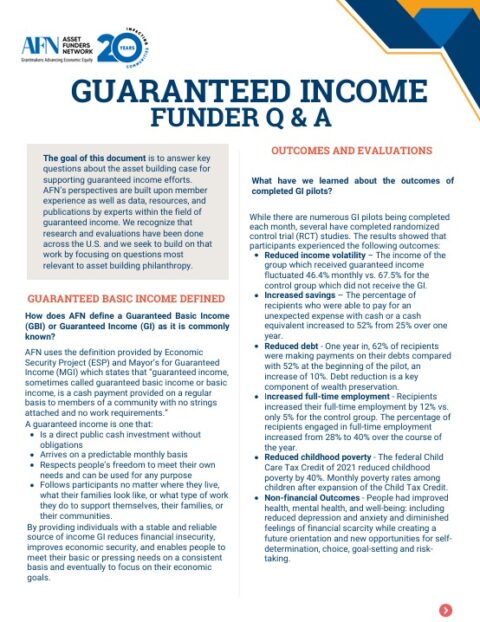 FROM THE CEO & PRESIDENT
FROM THE CEO & PRESIDENT
JANUARY 2021
“Philanthropy is commendable, but it must not cause the philanthropist to overlook the circumstances of economic injustice which make philanthropy necessary.”
– Dr. Martin Luther King, Jr., from a 1962 speech delivered at the Park Sheraton Hotel in New York.
“We will not be turned around or interrupted by intimidation, because we know our inaction and inertia will be the inheritance of the next generation. Our blunders become their burdens.”
– Amanda Gorman, a selection from poem,The Hill We Climb, read at President Biden’s Inauguration, January 2021.
Delivered more than a half century apart, these two messages offer a guide for us. They are optimistic challenges—both assessing that fundamental systemic change is required and that an equitable future is achievable with intentional action and perseverance. This message of the possibility of change to achieve our values of an inclusive economy is a key reminder. To afford everyone with the ability to thrive, especially when we are confronted with what is—financial insecurity for over half of the households who incur debt or deprive themselves of essentials that is only worsening with unemployment above 20% for the lowest paid workers—requires unstinting focus.
Philanthropy continues to have a leading-edge role in this endeavor to equitably increase income, assets, and economic security. Ideally, philanthropy invests in reforms that cause change, such that everyone has an equitable opportunity to achieve economic success in what should be a level equitable playing field—regardless of disability, race, ethnicity, or gender. AFN members embrace this systemic challenge intentionally in both fundamental and creative ways.
But, the events of 2020 and 2021 also remind us of the essential role of government.
Philanthropy’s best systemic reforms and new ideas will not be effectively implemented at scale without investment and policy reform. Government achieves expansive impact by how it invests revenues, regulates activities, and enforces the law. Yes, those powers are broadly demonized by some—yet the same powers are needed to gain the positive economic outcomes. The contribution of government to foster inclusive upward mobility is readily confirmable. Indeed, without the commitment of federal, state or local government powers and resources to establish and implement systems, we would not have had the growth from FHA loans to Social Security to EITC as tax policy to how we make quality education affordable from public schools to National Defense and Stafford Student Loans to support for research and development. It is hard to imagine the economic expansion of security and wealth of the middle class in this country without it—even as we realize that the past policies and implementation, in fact, are structurally flawed and must be improved upon or reinvented to be race and gender equitable.
To ensure the future economic playing field is inclusive and equitable, government can exercise the role to restrain unbridled and unprincipled behavior in the marketplace. They need to enforce laws that prohibit discrimination, adopt laws to stop exploitation in the form of exorbitant interest rates and unscrupulous lending. They need to end official acts that cause wealth stripping whether it be harmful fees and fines, or modern debtor prison, or civil actions that revive collection on phantom debt. The return of a vigilant Consumer Financial Protection Bureau (CFPB) and Justice Department at the federal level is a welcome development. Our efforts in philanthropy to advance guaranteed income, student debt forgiveness, and other policy reform is to intentionally move us to systemic economic equity. More than ever, our communities need these investments at scale. The aligned efforts of philanthropy and government can deliver an expanding ROI where all of us prosper.
This framework of economic abundance from the inclusive economic activity from all populations is where we need to focus our actions and advocacy. Let’s forcefully acknowledge the value add of immigrants (who are not looking over their shoulder as they perform in the workforce), of Black, Latino, and Indigenous entrepreneurs—as well as all women owners. Let’s commit to using a narrative that recognizes how these entrepreneurs can grow the economy and as a result, employ many more in the community. Let’s ensure that they and rural entrepreneurs get the access to capital, education and needed networks as it has been for privileged business owners for decades.
Actions to equitably increase the economy is the fuel of expansion and not a blunder of taking away from one to give to another as too many in our country fear. It is not unlike what the baby boom generation experienced, but this time it needs to be an expansion that undoes the circumstances and constraints of racism, sexism and economic injustice.
The members and staff of AFN will continue to work in community and with funders and an array of allies to ensure that ours is not judged to be inaction or inertia but of intentional moves of all the systemic levers toward providing the inheritance of economic equity and shared prosperity.
Make 2021 the year you join AFN to help achieve these future goals of equity.
 FROM THE CEO & PRESIDENT
FROM THE CEO & PRESIDENT

